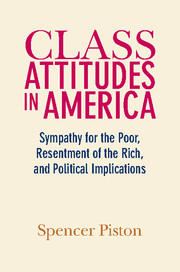 Class Attitudes in America
Class Attitudes in America Book contents
- Class Attitudes in America
- Class Attitudes in America
- Copyright page
- Dedication
- Contents
- Figures
- Tables
- Acknowledgments
- Introduction: Reigning Myths about Class Attitudes
- 1 In Their Own Words
- 2 A Theory of Attitudes toward Class Groups and Their Political Consequences
- 3 Attitudes toward the Poor and the Rich in the United States
- 4 Why So Many Americans Support Downward Redistribution
- 5 The Role of Political Knowledge
- 6 Effects of Class Group Attitudes on Vote Choice
- 7 Why Don’t Politicians Listen?
- Conclusion: The Path Behind and the Path Forward
- Appendices
- Endnotes
- References
- Index
- References
References
Published online by Cambridge University Press: 17 April 2018
- Class Attitudes in America
- Class Attitudes in America
- Copyright page
- Dedication
- Contents
- Figures
- Tables
- Acknowledgments
- Introduction: Reigning Myths about Class Attitudes
- 1 In Their Own Words
- 2 A Theory of Attitudes toward Class Groups and Their Political Consequences
- 3 Attitudes toward the Poor and the Rich in the United States
- 4 Why So Many Americans Support Downward Redistribution
- 5 The Role of Political Knowledge
- 6 Effects of Class Group Attitudes on Vote Choice
- 7 Why Don’t Politicians Listen?
- Conclusion: The Path Behind and the Path Forward
- Appendices
- Endnotes
- References
- Index
- References
- Type
- Chapter
- Information
- Class Attitudes in AmericaSympathy for the Poor, Resentment of the Rich, and Political Implications, pp. 201 - 226Publisher: Cambridge University PressPrint publication year: 2018


